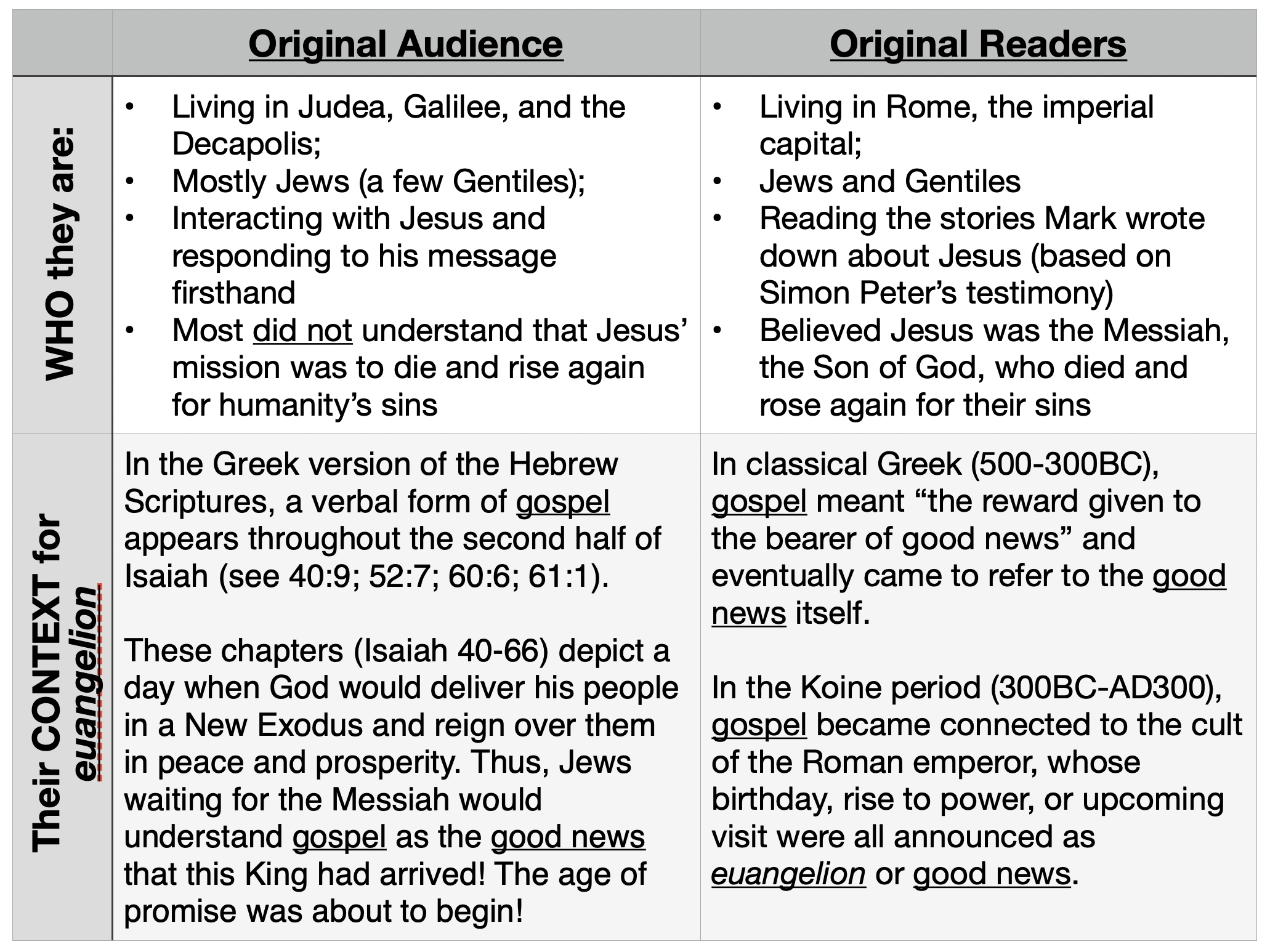Discover the Gospel of Mark in 3 Weeksნიმუში

The Beginning of the Gospel of Jesus (Mark 1:1-15)
The beginning of the good news about Jesus the Messiah, the Son of God. Mark 1:1 (NIV)
Context:
On Day 1, we defined literary context as “how a verse or passage fits into the bigger picture of what is written around it.”Another significant aspect of literary context involves consideration of the particular type of literature, or genre, of a biblical book and that genre’s associated characteristics.
Mark’s specific genre is: “gospel.” One thing that is important to know about this genre is that it often conveys the viewpoints of two distinct groups: (1) that of the original audience, the person/groups who appear in the gospel stories as characters, and; (2) that of the original readers, the specific community for whom the text was initially written by the author. For example, John the Baptist (Mark 1:4), the crowds (Mark 1:5), and Jesus (Mark 1:9) are all part of the original audience of Mark’s Gospel. Mark’s original readers are the church in Rome (identified in the historical background video from Day 1).
When interpreting a gospel, distinguishing the perspectives of the original readers and the original audience is critical, since they tend to have very different historical contexts. This is illustrated by the different ideas that would first come to mind when each heard (or read) the word euangelion, which Mark uses repeatedly in his introduction (Mark 1:1-15). In English Bibles, euangelion is translated as gospel or good news. See chart below.

Observation:
Depending on your translation, observe the repetition of gospel or good news in Mark 1:1-15. Notice what is mentioned in the context of this term.
- It is found in the book’s opening line, almost like a title. There, the gospel is “about Jesus the Messiah, the Son of God” (Mark 1:1)
- The gospel about Jesus is closely connected to the prophetic writings from the Hebrew Bible (Mark 1:2-3)
- Later on, Jesus himself announces the gospel (Mark 1:14-15)
- Jesus associates the gospel with the arrival of God’s kingdom (Mark 1:14-15)
- The announcement of the gospel calls the original audience to respond through repentance and belief (Mark 1:15)
In the context of this good news, pay attention to the fact that there are also difficult things happening:
- John the Baptist is imprisoned (Mark 1:14)
- Jesus is driven by the Spirit into the wilderness (with the wild animals) to be tempted by Satan for 40 days (Mark 1:12-13)
Interpretation:
Mark’s use of euangelion (gospel or good news) in the very first line of his book suggests he wants readers to interpret all the stories about Jesus that follow in light of this term:
- Consider the challenge the original audience might feel when they heard Jesus preach about the gospel. His call for them to “repent and believe the good news” (in Mark 1:15) could be viewed as a charge to lay aside their preconceived ideas about God’s kingdom.
- In Greek, the word for “repentance” suggests that a person has turned around in their thinking and is now heading in a different direction. In what ways might the original audience’s ideas about the arrival of God’s kingdom (identified in the chart in the section on Context) need to be “turned around”?
- When the church in Rome (Mark’s original readers) read this word, what cultural ideas might they begin to associate with Jesus? What expectations might they begin to form about him and his kingdom?
- How might the difficulties faced by John the Baptist (in prison) and Jesus (in the wilderness) challenge the original readers understanding of the good news Jesus preached?
Application:
The gospel of Jesus will challenge many of our personal and cultural expectations of how God’s kingdom should appear. Can you identify some of the ways you think God’s kingdom should show up in your life and in our world? What are some expectations your culture places on Jesus and his kingdom?
In what ways is the kingship of Jesus actually being manifested in your life and in our world?
წმიდა წერილი
About this Plan

This plan is intended as a guide to help you discover the message of Mark’s Gospel for yourself! Grab a notebook to jot down your thoughts as you are led through a process of: (1) observing the Gospel of Mark; (2) interpreting the original message to the church in Rome; and (3) applying the Gospel’s timeless truths to your life today.
More









